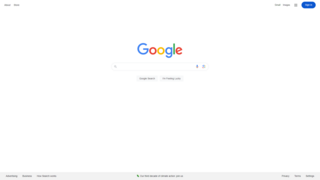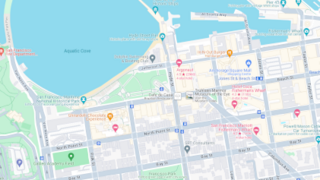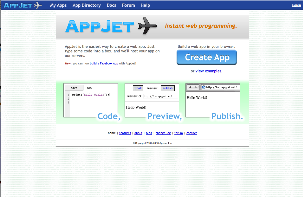Related Research Articles

Google Search is a search engine operated by Google. It allows users to search for information on the Internet by entering keywords or phrases. Google Search uses algorithms to analyze and rank websites based on their relevance to the search query. It is the most popular search engine worldwide.

MSN is a web portal and related collection of Internet services and apps for Windows and mobile devices, provided by Microsoft and launched on August 24, 1995, alongside the release of Windows 95.

Google Maps is a web mapping platform and consumer application offered by Google. It offers satellite imagery, aerial photography, street maps, 360° interactive panoramic views of streets, real-time traffic conditions, and route planning for traveling by foot, car, bike, air and public transportation. As of 2020, Google Maps was being used by over one billion people every month around the world.
Google Earth is a computer program that renders a 3D representation of Earth based primarily on satellite imagery. The program maps the Earth by superimposing satellite images, aerial photography, and GIS data onto a 3D globe, allowing users to see cities and landscapes from various angles. Users can explore the globe by entering addresses and coordinates, or by using a keyboard or mouse. The program can also be downloaded on a smartphone or tablet, using a touch screen or stylus to navigate. Users may use the program to add their own data using Keyhole Markup Language and upload them through various sources, such as forums or blogs. Google Earth is able to show various kinds of images overlaid on the surface of the Earth and is also a Web Map Service client. In 2019, Google revealed that Google Earth now covers more than 97 percent of the world, and has captured 10 million miles of Street View imagery.
XULRunner is a discontinued, packaged version of the Mozilla platform to enable standalone desktop application development using XUL, developed by Mozilla. It replaced the Gecko Runtime Environment, a stalled project with a similar purpose. The first stable developer preview of XULRunner was released in February 2006, based on the Mozilla 1.8 code base. Mozilla stopped supporting the development of XULrunner in July 2015.

Google Analytics is a web analytics service offered by Google that tracks and reports website traffic and also the mobile app traffic & events, currently as a platform inside the Google Marketing Platform brand. Google launched the service in November 2005 after acquiring Urchin.
Dodgeball was a location-based social networking software provider for mobile devices. Users texted their locations to the service, which then notified them of crushes, friends, friends' friends, and interesting venues nearby. Google acquired Dodgeball in 2005 and discontinued it in 2009, replacing it with Google Latitude.

Microsoft Bing, commonly referred to as Bing, is a search engine owned and operated by Microsoft. The service traces its roots back to Microsoft's earlier search engines, including MSN Search, Windows Live Search, and Live Search. Bing offers a broad spectrum of search services, encompassing web, video, image, and map search products, all developed using ASP.NET.
Google Developers is Google's site for software development tools and platforms, application programming interfaces (APIs), and technical resources. The site contains documentation on using Google developer tools and APIs—including discussion groups and blogs for developers using Google's developer products.

Jaiku was a social networking, micro-blogging and lifestreaming service comparable to Twitter, founded a month before the latter. Jaiku was founded in February 2006 by Jyri Engeström and Petteri Koponen from Finland and launched in July of that year. It was purchased by Google on October 9, 2007.

Microsoft Popfly was a Website that allowed users to create web pages, program snippets, and mashups using the Microsoft Silverlight rich web applications runtime and the set of online tools provided. It was discontinued on August 24, 2009.

AppJet, Inc. was a website that allowed users to create web-based applications on a client web browser. AppJet was founded by three MIT graduates, two of whom were engineers at Google, before starting AppJet. They launched their initial public beta on December 12, 2007, allowing anyone to create a web app.
Google App Engine is a cloud computing platform as a service for developing and hosting web applications in Google-managed data centers. Applications are sandboxed and run across multiple servers. App Engine offers automatic scaling for web applications—as the number of requests increases for an application, App Engine automatically allocates more resources for the web application to handle the additional demand.
Google Chrome is a web browser developed by Google. It was first released in 2008 for Microsoft Windows, built with free software components from Apple WebKit and Mozilla Firefox. Versions were later released for Linux, macOS, iOS, and also for Android, where it is the default browser. The browser is also the main component of ChromeOS, where it serves as the platform for web applications.
Google Native Client (NaCl) is a discontinued sandboxing technology for running either a subset of Intel x86, ARM, or MIPS native code, or a portable executable, in a sandbox. It allows safely running native code from a web browser, independent of the user operating system, allowing web apps to run at near-native speeds, which aligns with Google's plans for ChromeOS. It may also be used for securing browser plugins, and parts of other applications or full applications such as ZeroVM.
Google Latitude was a location-aware feature of Google Maps, developed by Google as a successor to its earlier SMS-based service Dodgeball. Latitude allowed a mobile phone user to allow certain people to view their current location. Via their own Google Account, the user's cell phone location was mapped on Google Maps. The user could control the accuracy and details of what each of the other users can see — an exact location could be allowed, or it could be limited to identifying the city only. For privacy, it could also be turned off by the user, or a location could be manually entered. Users had to explicitly opt into Latitude and were only able to see the location of those friends who had decided to share their location with them.

Chromium is a free and open-source web browser project, primarily developed and maintained by Google. This codebase provides the vast majority of code for the Google Chrome browser, which is proprietary software with additional features.

Google Plugin for Eclipse (GPE) was a set of development tools that enabled Java developers to design, build, optimize, and deploy cloud computing applications. developers in creating complex user interfaces, generating Ajax code using the GWT Web Toolkit, and deploying applications to Google App Engine. GPE installed into the Eclipse integrated development environment (IDE) using the extensible plugin system. GPE was available under the Eclipse Public License 1.0.

Google Messages is a text messaging software application developed by Google for its Android and Wear OS mobile operating systems, while it's also available via the Web.
References
- ↑ "Farewell to Mashup Editor". Blogspot . July 15, 2009. Retrieved July 15, 2009.
- ↑ "Google Bids Fond Farewell To Some Apps". CRN . January 15, 2009. Retrieved January 15, 2009.